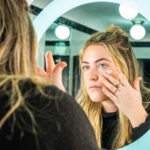[ad_1]
Dovecot’s major autumn exhibition, KNITWEAR CHANEL to Westwood, will foreground the work of innovative contemporary Scottish knitwear designers such as La Fetiche and Di Gilpin. These will be displayed alongside designs by Gabrielle ‘Coco’ Chanel, Vivienne Westwood, and late 20th century fashion by Sonia Rykiel and Comme des Garçons charting the progression of knitwear in fashion.
The exhibition will present over 150 incredible knitwear pieces from the collection of Mark and Cleo Butterfield, renowned as the King and Queen of Vintage. An entire section dedicated to Shetland’s iconic ‘Fair Isle’ jumpers, popularised by Edward VIII who famously wore his in public while golfing at St Andrews, will form part of this nostalgic journey though the history of 20th and 21st century knitwear. From rare, crocheted evening dresses from the 1930s, to the modern innovations they have influenced such as Julien MacDonald’s lace knit eveningwear and ‘disintegrating’ knitwear by Vivienne Westwood.
KNITWEAR CHANEL to Westwood will also highlight and celebrate the creativity of contemporary knitwear in Scotland. The Scottish hand knitting design studio Di Gilpin has worked with major brands to push the tradition of hand knit in new directions. Taking inspiration from artists such as Sophie Taeuber-Arp and drawing on knitwear heritage including Celtic, Fair Isle and Shoowa cloth designs, Gilpin’s work provides a snapshot of ingenious fashion. A number of works are collaborative pieces between Gilpin and La Fetiche. Exhibition Curator Dennis Nothdruft commented, Knitwear is imbued with narrative and memory. This exhibition is a way of accessing other people’s stories, in particular the fashion sensibilities of collectors Mark and Cleo Butterfield through their iconic and personal pieces. Highlights include rare CHANEL cardigan suits, 1930s swimwear, vibrant Missoni patterns and 1970s Bill Gibb as well as conceptual garments by Comme des Garçons, Vivienne Westwood and Julien MacDonald.
By exploring how women’s attitudes to dress changed during World War One, the exhibition moves from CHANEL’s easy-wear twinsets coming out of Paris in the 1920s to the era of ‘make do and mend’ during the Second World War. This wartime mindset mean that women had to find creative ways of recycling garments; sweaters were unravelled, and the recycled yarn was then knitted into multi-colour jumpers made of various wool varieties. By the 1950s, the influence of Hollywood stars saw the rise of the cocktail sweater, a glamorous knit designed for fashion, not function, with a defined waist and embellishments at the neck and shoulders.
The crocheted mini became a staple of the 1960s youth quake style, with patterns becoming available so that young women could create their own. The novelty knit appeared in the 1970s and has become synonymous with the Era. The ‘80s saw the development of unique and sophisticated knitwear collections from the likes of Vivienne Westwood, Rei Kawakubo for Comme des Garçons, Zandra Rhodes and Sonia Rykiel. As the exhibition takes audiences forward to the 1990s, the collections of Julien MacDonald are highlighted as they challenged the idea of the knitted garment; his experimental use of unorthodox materials electrified fashion and influenced many current designers.
Dovecot Director, Celia Joicey commented, Decade by decade, this important exhibition charts over 100 years of knitwear history exploring not only key designers but also technical innovations in hand, machine and industrial knitting. The importance of knitwear in fashion can be taken for granted, but this exhibition is an opportunity to celebrate knitwear’s distinctive place in Scotland’s cultural and economic history and to inspire future design directions.
KNITWEAR CHANEL to Westwood marks a collaboration between Dovecot Studios and the Fashion and Textile Museum in London, where the exhibition was first shown. Dovecot’s next exhibition will see Kaffe Fassett’s work celebrated. Considered one of the most successful artists and designers working in contemporary craft today, Fassett’s career spans over 50 years, encompassing knitting, needlepoint, mosaic, quilting, textile design, painting and drawing. Scottish fashion designer Bill Gibb was a constant inspiration and sometime-collaborator to the American-born, British-based artist. Fassett’s work attracts a considerable following worldwide. His books and projects have encouraged millions to make and to create with his designs being used and interpreted by quilters around the globe. His work was the subject of a 1988 one-man show at the Victoria & Albert Museum, the first of its kind for a living textile artist. Dovecot’s 2023 exhibition explores Fassett’s world, drawing on original artworks from invited international makers. Textiles works, photographs and archival material will illuminate the work of this distinctive, influential artist and designer.
Dovecot Studios
10 Infirmary St, Edinburgh EH1 1LT, United Kingdom
[ad_2]
Source link











